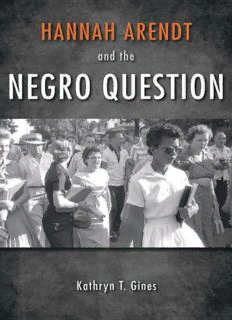
Hannah Arendt and the Negro Question PDF
Preview Hannah Arendt and the Negro Question
HannaH arendt and the negro Question Han naH ar endt and the negro Question Kathryn t. gines indiana university Press Bloomington and indianapolis This book is a publication of indiana university Press office of scholarly Publishing Herman B Wells Library 350 1320 east 10th street Bloomington, indiana 47405 usa iupress.indiana.edu Telephone 800- 842- 6796 Fax 812- 855- 7931 © 2014 by Kathryn t. gines all rights reserved no part of this book may be reproduced or utilized in any form or by any means, electronic or mechanical, in clud ing photocopying and recording, or by any information storage and retrieval system, without permission in writing from the publisher. The association of ameri can university Presses’ resolution on Permissions consti- tutes the only exception to this prohibition. The paper used in this publication meets the minimum re- quirements of the ameri can national standard for information sciences—Permanence of Paper for Printed Library Materials, ansi Z39.48–1992. Manufactured in the united states of america Cataloging information is available from the Library of Congress. isBn 978-0-253-01167-1 (cloth) isBn 978-0-253-01171-8 (paperback) isBn 978-0-253-01175-6 (ebook) 1 2 3 4 5 19 18 17 16 15 14 To my mother, Kathleen Smallwood Johnson, whom I watched go to law school while caring for six children and four adults. You taught me about the implications of Supreme Court decisions and their impact on constructions of race and systems of racism. To my partner, Jason, and our children, Jason II, Kyra, Jaden, and Kalia, for your patience and support through it all. And to my dearest “sisters in writing” for our weekly writing retreats and for the precious gifts of encouragement and enthusiasm. What is important for me is to understand. For me, writing is a matter of seeking this understanding, part of the process of understanding. . . . Men always want to be terribly influential, but i see that as somewhat external. . . . i want to understand. and if others understand—in the sense that i have understood— that gives me a sense of satisfaction, like feeling at home. —Hannah arendt, interview with günter gaus (oc to ber 28, 1964) The very process of opinion formation is determined by those in whose places somebody thinks and uses his own mind, and the only condition for this exertion of the imagination is disinterestedness, the liberation from one’s own private interests. . . . i remain in this world of universal interdependence, where i can make myself the representative of everybody else. —Hannah arendt, Between Past and Future Contents Preface xi acknowledgments xiii abbreviations xv introduction 1 1 “The girl, obviously, Was asked to Be a Hero” 14 2 “The Most outrageous Law of south ern states—the Law Which Makes Mixed Marriage a Criminal offense” 30 3 “The Three realms of Human Life: The Po liti cal, the social, and the Private” 43 4 “The end of revolution is the Foundation of Freedom” 59 5 “a Preparatory stage for the Coming Catastrophes” 77 6 “only Violence and rule over others Could Make some Men Free” 93 7 “a Much greater Threat to our institutions of Higher Learning than the student riots” 112 Conclusion: The role of Judgment in arendt’s approach to the negro Question 123 notes 131 index 167
Description: